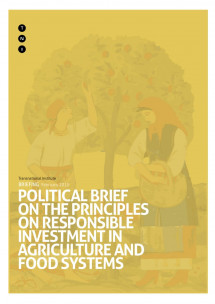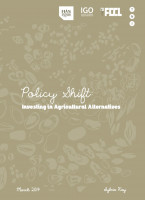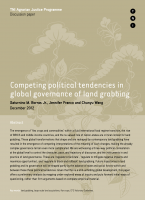Political brief on the Principles on Responsible Investment in Agriculture and Foodsystems
The RAI principles do not move further in navigating the slippery terrain of defining ‘responsible’ versus ‘irresponsible’ investment - possibly resulting in them doing more harm than good. It is essential to push back against a regressive use of the principles and monitor what other actors are doing in the name of the principles.

Autores
On October 15, 2014, the Member States of the Committee on World Food Security (CFS), hosted at the United Nations Food and Agriculture Organisation, approved the “Principles on Responsible Investment in Agriculture and Food Systems”. With the objective to “promote responsible investments in agriculture and food systems that contribute to food security and nutrition, thus supporting the progressive real- isation of the right to adequate food in the context of national food security”, the responsible agricultural investment or ‘rai principles’ are the outcome of a more than two year global consultative process, involving governments,civil society organisations, the private sector, UN agencies, development banks, foundations, research institutions and academia.
The negotiation of the principles often proved arduous, reflecting the highly contested nature of investment in agriculture, and the economic and political interests that lie at the heart of this issue. While civil society organisations, supported at times by various Member States, argued for a set of human-rights based principles that would help mobilise public investments and public policies in support of small-scale food producers and workers and local food production systems, the private sector and a number of other governments pushed for a set of minimalist, regulation-light principles, in which large-scale (corporate) investments and market mechanisms predominate.
The subsequent rai principles do not resolve this tension and thus, despite their laudable aim, do not move us much further in navigating the slippery terrain of defining ‘responsible’ versus ‘irresponsible’ investment - an ambiguity that could result in them doing more harm than good. It is therefore essential for civil society organisations to push back against a regressive use of the rai principles and monitor what other actors are doing in the name of the principles.
The Ten RAI Principles
- Principle 1: Contribute to food security and nutrition
- Principle 2: Contribute to sustainable and inclusive economic development and the eradication of poverty
- Principle 3: Foster gender equality and women’s empowerment
- Principle 4: Engage and empower youth
- Principle 5: Respect tenure of land, fisheries, forests and access to water
- Principle 6: Conserve and sustainably manage natural resources, increase resilience, and reduce disaster risks
- Principle 7: Respect cultural heritage and traditional knowledge, and support diversity and innovation
- Principle 8: Promote sage and healthy agriculture and food systems
- Principle 9: Incorporate inclusive and transparent governance structures, processes, and grievance mechanisms
- Principle 10: Assess and address impacts and promote accountability



